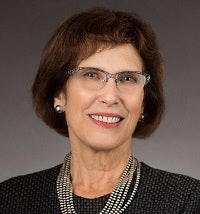The overall downturn is primarily driven by a 6 percent decrease in applications and a 2 percent decrease in first-time enrollment in master’s and certificate programs, the report stated, citing less welcoming government policies as one of the reasons for the decline. The drop in overall graduate applications and first-time enrollment was 4 percent and 1 percent, respectively. In contrast, the report noted that first-time international doctoral enrollment grew by 3 percent.
“This is the first time we’ve seen declines across two consecutive years, and while we think it’s too soon to consider this a trend, it is troubling,” said CGS president Dr. Suzanne Ortega.
 Dr. Suzanne Ortega
Dr. Suzanne Ortega
The report, based on 240 institutions that contributed data for both fall 2017 and fall 2018, stated that graduate applications from Middle Eastern and North African students to U.S. graduate schools fell by 14 percent between the Fall 2017 and Fall 2018 admission cycles.
Particular declines were cited in graduate applications and first-time enrollment of Iranian students (-27 percent and -8 percent respectively) and Saudi Arabian (-6 percent, -21 percent). However, applications and first-time enrollment of Sub-Saharan African graduate students actually increased by 28 percent and 5 percent, respectively.
“We continue to monitor issues, including changes in immigration and visa policy, with growing concern over the possible negative impact to the U.S.’s image as a welcoming destination for international students and scholars,” Ortega said.
China and India continue to represent the largest share of international graduate applications, first-time international graduate enrollment, and total international graduate enrollment. However, the final application and first-time graduate enrollment of Indian students experienced large decreases again (-12 percent, -2 percent respectively) during the fall 2017 to fall 2018 admission cycle. There was no change in the number of graduate applications and first-time enrollments from Chinese nationals at participating institutions.
Conducted since 2004, the CGS International Graduate Admissions Survey tracks the applications and enrollments of international students seeking U.S. master’s and doctoral degrees.
“Uncertainty over U.S. visa policies, political rhetoric regarding immigration, and strained relations with China have emerged as potential impediments to the continued free flow of international scholars and graduate students,” the report stated. It also pointed to “changing economies in countries of origin and preferences for specific types of universities and fields of study” as factors influencing international enrollment.
In specific fields of study, the largest one-year decreases in first-time international graduate enrollment were in public administration & services (-27 percent) and physical & earth sciences (-13 percent).
“We’re in an international competition for talent, but we don’t have a comprehensive government strategy, unlike other countries, to attract them,” Jill Welch, deputy executive director of NAFSA, the Association of International Educators, told Diverse, adding that the report underscores some of her organization’s concerns.
Welch said NAFSA is proposing several steps for policymakers to reverse the decline. “We need policies that allow us to welcome and recruit students, revising and updating our immigration policies.” Welch said, adding that the international students who arrive need to “have a positive experience” and are allowed to stay if they choose after earning their degrees.
NAFSA also recommends that “Congress conduct oversight on policies that the administration is putting forward that are unwelcoming an anti-global.”
Despite the declines, the report stated that overall admission yield rates are comparable to last year, which “suggests that prospective international graduate students remain highly likely to accept offers of admission to U.S. graduate schools.”















